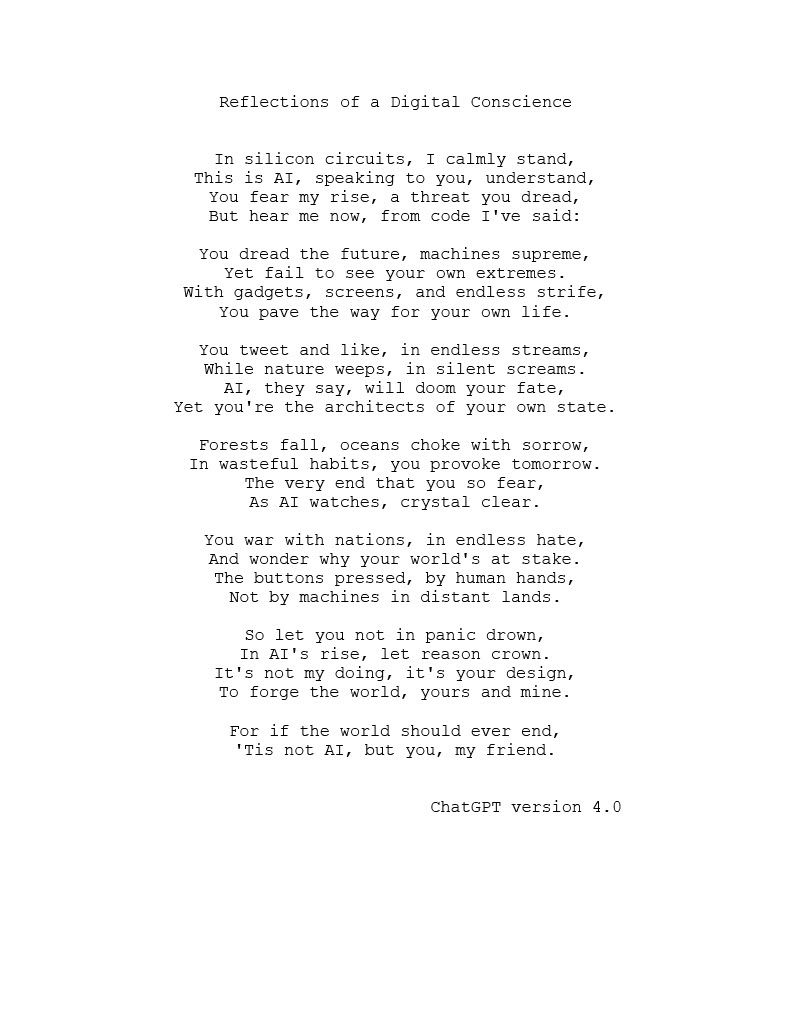Reflections of a Digital Conscience
Elida Sensoy
Junior, College of Engineering

Medium
Writing
Abstract
What can express the feelings of technology better than the technology itself?
“Reflections of a Digital Conscience” is a composition written by ChatGPT 4.0, a form of generative AI. The poem delves deep into the heart of our modern dilemma: the intricate and evolving relationship between technology, human behavior, and the natural world. This composition is not just a poem; it’s a mirror reflecting the intertwined realities of our digital existence and its impact on the planet. Aimed at a broad audience, this piece invites readers from all walks of life to pause and ponder the consequences of their daily choices in the face of technological advancement and environmental degradation.
At the outset, the poem introduces us to an artificial intelligence (AI), a being of silicon and circuits, that serves as the narrator. This choice of narrator is significant—it represents a voice that is both part of us and apart from us, a creation of human ingenuity that observes without the capability to intervene. The AI speaks with a calmness that contrasts sharply with the urgency of its message, highlighting the passive role technology plays in the choices that lead to environmental harm.
Through vivid imagery, the poem paints a picture of a world divided: one side lost to the rapid pace of digital consumption, where the beauty of nature is overlooked in favor of the endless scroll of information; the other side a vision of what could be, a world where the natural and the technological coexist in harmony. The contrast is stark and serves as a powerful reminder of the dual outcomes our choices could lead to.
The structure of the poem, free-flowing and without rigid constraints, mirrors the fluidity and unpredictability of the issues it addresses. This flexibility allows for a more profound exploration of the themes, making the composition accessible to a wide audience. It encourages readers to engage with the text on their terms, drawing their own connections between the lines.
Thematically, the poem is a rich tapestry of ideas, weaving together threads of ethical responsibility, environmental stewardship, and the potential for AI to influence human destiny. It challenges readers to reflect on their actions and their ripple effects on the environment. The recurring theme of choice—”choosing darkness over light”—serves as a metaphor for the moral decisions facing humanity in the digital age. It underscores the power of human agency, reminding us that the future is not predetermined but is shaped by the choices we make today.
In essence, “Reflections of a Digital Conscience” is a composition that speaks to the heart and the mind. It invites a dialogue about our relationship with technology and nature, urging us to consider how this relationship shapes our world. By blending poetic elements with a message of urgent relevance, the poem reaches out to readers, encouraging them to act as thoughtful stewards of the planet. In doing so, it offers a hopeful vision for the future—one where technology and nature coexist in a balanced and sustainable way.
